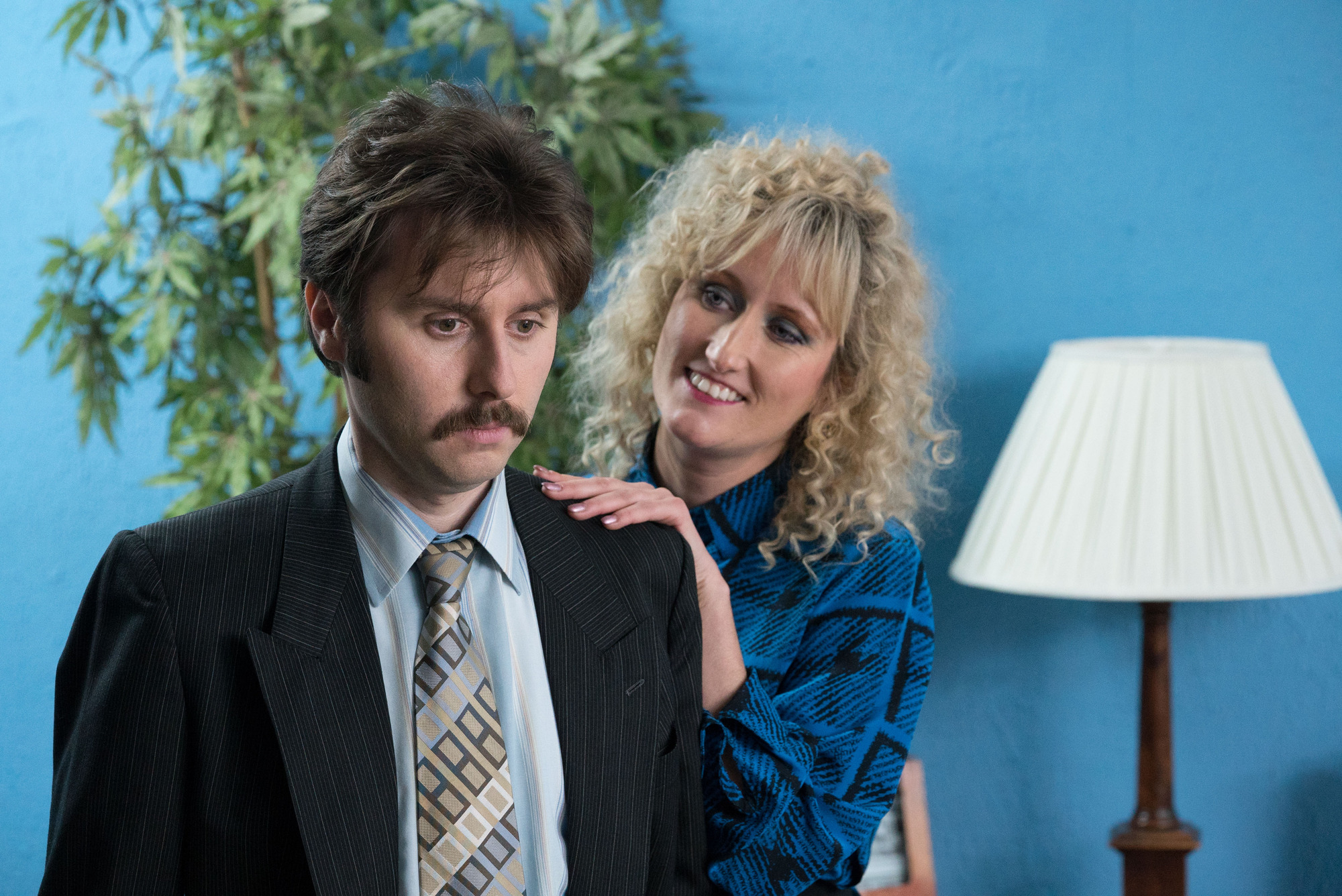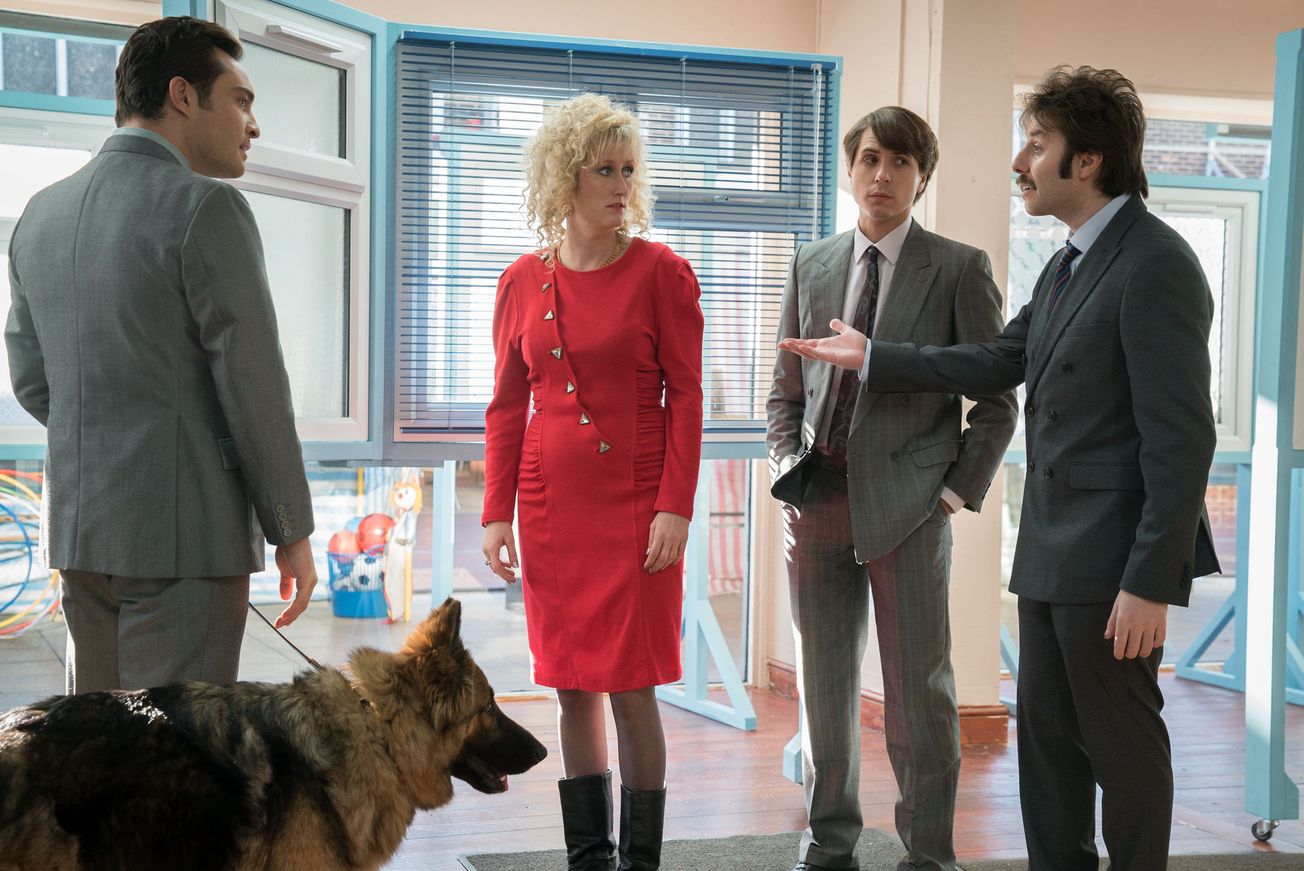By Leah Martindale, Third Year, Film & TV
The BBC series has returned for a second season and produces more of the same wonderfully awkward humour, set in a 1983 double glazing showroom with charismatic salespeople aplenty.
White Gold returned to our screens in March, and with its trademark cheeky-chappy charm, grimy ‘80s aesthetic, and reference to era-specific oddities it is a welcome respite from the down-and-out, Brit-grit permeating television. With an explosive plot development over the reasonably short six-episode season, the show is engaging, funny, and just the light entertainment I need in this period of intense uni work.
Youtube / BBC
The show features a host of recognisable British talents, including Gossip Girl’s (2007-2012) Chuck Bass, Ed Westwick as the glibly charming, serial cheater, protagonist Vincent Swan, aptly swanning his way through life. Westwick’s recent sexual assault and rape allegations put filming of Season Two on ‘pause’, but since the cases were dropped the filming was picked back up. Westwick’s allegations mirrored dangerously the hypermasculine stereotype his character embodies.
The show also features The Inbetweeners (2008-10) leads James Buckley and Joe Thomas as Brian Fitzpatrick and Martin ‘Lavatory’ Lavender. Buckley and Thomas risk serious typecasting in future roles, as Fitzpatrick is equally slimy, cocky, and unshaggable as Jay Cartwright, and Lavender is the trademark wimpy, smart but useless, pretty-boy stereotype Simon Cooper fought desperately to evade.
Fellow The Inbetweeners Movie (2011) cast member and Drifters (2013-2016) protagonist, the ever-hilarious Lauren O’Rourke continues in the role as the hilariously daft, gossip-stirring receptionist Carol. Eastenders (1985-) and The Catherine Tate Show (2004-06) regular Lee Ross appears far more often as the dangerous gangster turned double-glazing businessman Ronnie Farrell, with the tip-of-the-tongue recognisable Theo Barklem-Biggs, of The Inbetweeners Movie - sensing a theme? - and Kingsman: The Secret Service (2014) notoriety, as his incapable but desperately weird son. Other recognisable recurring characters include Rachel Shenton and Jack Doolan, as a cat-like, sex-craved saleswoman and bizarrely old-looking business exec respectively.

Photo courtesy of BBC
The show’s premise is simple and plot development exciting but predictable, with child actors as convincing as Cachet’s double-glazing and laugh-out-loud moments betraying the show’s dubious production quality. White Gold’s true charm lies in its self-awareness. With audience asides and direct address aplenty, recurrent jokes, and heightened character tropes, White Gold Season Two celebrates its returning audience and rewards us with a knowing mix of kind-of-crap, easily bingeable, and tangibly hilarious.
With sets varying from Essex to Malta, massive ill-gotten country houses to highstreet double-glazing showrooms, and bedrooms to phone boxes, the show maintains its identifiable aesthetic. The soundtrack features ‘80s classics such as Paul Young, Grace Jones, and The Cure, and its playlist is perfect listening for firing out an essay.
White gold is such an underrated TV series pic.twitter.com/SMH4MHjQdC
— Aimee Johnston-Morley (@johnston_morley) March 27, 2019
Much as the U.S. remake of The Inbetweeners was an embarrassing mistake, White Gold’s charm is inherently British. The humour is wry and the style is comparable to Guy Ritchie’s Snatch (2000), Friday Night Dinner (2011-), and Peep Show (2003-15). I doubt the show’s appeal has transnational potential, and even those thoroughly entrenched in British culture as a second home would likely find it boring, weird, or off-putting: but to me, born and bred on Porridge (1973-77) and Only Fools and Horses (1981-2003), the show has a homely charm, like an old blanket or a drunk uncle at Christmas.
The show pays homage to its era of set, the 1980s, in costume, aesthetic, style, and even the continual references to the board game of mid-century origins, Stratego. White Gold Season Two deserves pride of place in a time capsule dedicated to the 2010s' misremembering of the past, romanticisation of the awkward, and everlasting untranslatable British humour.
White Gold Season 2 is available in its entirety on BBC iPlayer while each episode airs on BBC2, Wednesdays 10pm.
Featured Image Credit: Photo courtesy of BBC
Are your student windows impervious to the gale of addictive humour in White Gold?
Facebook // Epigram Film & TV // Twitter








